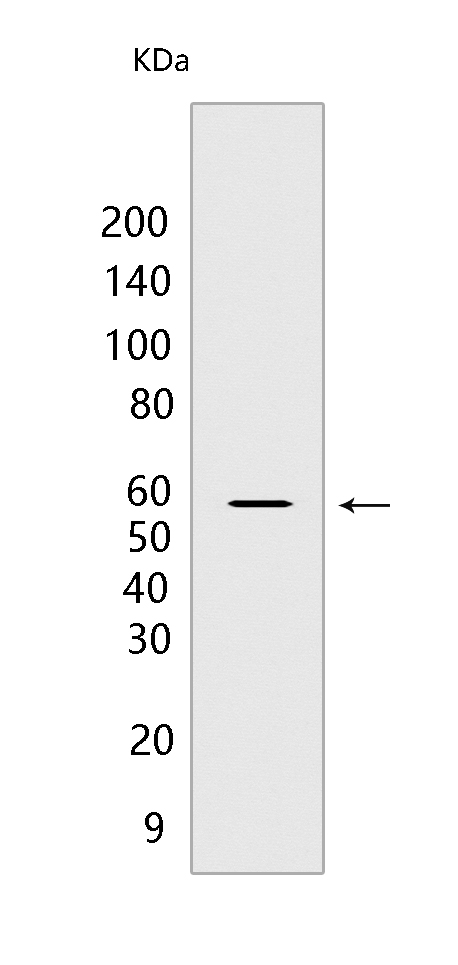PKM2 Rabbit mAb[ZPLW]Cat NO.: A23648
Western blot(SDS PAGE) analysis of extracts from Mouse skeletal muscle tissue lysate.Using PKM2 Rabbit mAb IgG [ZPLW] at dilution of 1:1000 incubated at 4℃ over night.
Product information
Protein names :PKM,OIP3,PK2,PK3,PKM2,KPYM_HUMAN,Pyruvate kinase PKM
UniProtID :P14618
MASS(da) :57,937
MW(kDa) :58kDa
Form :Liquid
Purification :Protein A purification
Host :Rabbit
Isotype :IgG
sensitivity :Endogenous
Reactivity :Human,Mouse,Rat
- ApplicationDilution
- 免疫印迹(WB)1:1000-2000
- The optimal dilutions should be determined by the end user
Specificity :Antibody is produced by immunizing animals with a synthetic peptide of human PKM2.
Storage :Antibody store in 10 mM PBS, 0.5mg/ml BSA, 50% glycerol. Shipped at 4°C. Store at-20°C or -80°C. Products are valid for one natural year of receipt.Avoid repeated freeze / thaw cycles.
WB Positive detected :Mouse skeletal muscle tissue lysate
Function : Catalyzes the final rate-limiting step of glycolysis by mediating the transfer of a phosphoryl group from phosphoenolpyruvate (PEP) to ADP, generating ATP (PubMed:20847263, PubMed:15996096, PubMed:1854723). The ratio between the highly active tetrameric form and nearly inactive dimeric form determines whether glucose carbons are channeled to biosynthetic processes or used for glycolytic ATP production (PubMed:20847263, PubMed:15996096, PubMed:1854723). The transition between the 2 forms contributes to the control of glycolysis and is important for tumor cell proliferation and survival (PubMed:20847263, PubMed:15996096, PubMed:1854723).., [Isoform M2]: Isoform specifically expressed during embryogenesis that has low pyruvate kinase activity by itself and requires allosteric activation by D-fructose 1,6-bisphosphate (FBP) for pyruvate kinase activity (PubMed:18337823, PubMed:20847263). In addition to its pyruvate kinase activity in the cytoplasm, also acts as a regulator of transcription in the nucleus by acting as a protein kinase (PubMed:18191611, PubMed:21620138, PubMed:22056988, PubMed:22306293, PubMed:22901803, PubMed:24120661). Translocates into the nucleus in response to various signals, such as EGF receptor activation, and homodimerizes, leading to its conversion into a protein threonine- and tyrosine-protein kinase (PubMed:22056988, PubMed:22306293, PubMed:22901803, PubMed:24120661, PubMed:26787900). Catalyzes phosphorylation of STAT3 at 'Tyr-705' and histone H3 at 'Thr-11' (H3T11ph), leading to activate transcription (PubMed:22306293, PubMed:22901803, PubMed:24120661). Its ability to activate transcription plays a role in cancer cells by promoting cell proliferation and promote tumorigenesis (PubMed:18337823, PubMed:22901803, PubMed:26787900). Promotes the expression of the immune checkpoint protein CD274 in ARNTL/BMAL1-deficient macrophages (By similarity). May also act as a translation regulator for a subset of mRNAs, independently of its pyruvate kinase activity: associates with subpools of endoplasmic reticulum-associated ribosomes, binds directly to the mRNAs translated at the endoplasmic reticulum and promotes translation of these endoplasmic reticulum-destined mRNAs (By similarity). Plays a role in caspase independent cell death of tumor cells (PubMed:17308100).., [Isoform M1]: Pyruvate kinase isoform expressed in adult tissues, which replaces isoform M2 after birth (PubMed:18337823). In contrast to isoform M2, has high pyruvate kinase activity by itself and does not require allosteric activation by D-fructose 1,6-bisphosphate (FBP) for activity (PubMed:20847263)..
Tissue specificity :[Isoform M2]: Specifically expressed in proliferating cells, such as embryonic stem cells, embryonic carcinoma cells, as well as cancer cells..,[Isoform M1]: Expressed in adult tissues (PubMed:18337823). Not expressed in tumor cells (PubMed:18337823)..
Subcellular locationi :[Isoform M2]: Cytoplasm. Nucleus.
IMPORTANT: For western blots, incubate membrane with diluted primary antibody in 1% w/v BSA, 1X TBST at 4°C overnight.


